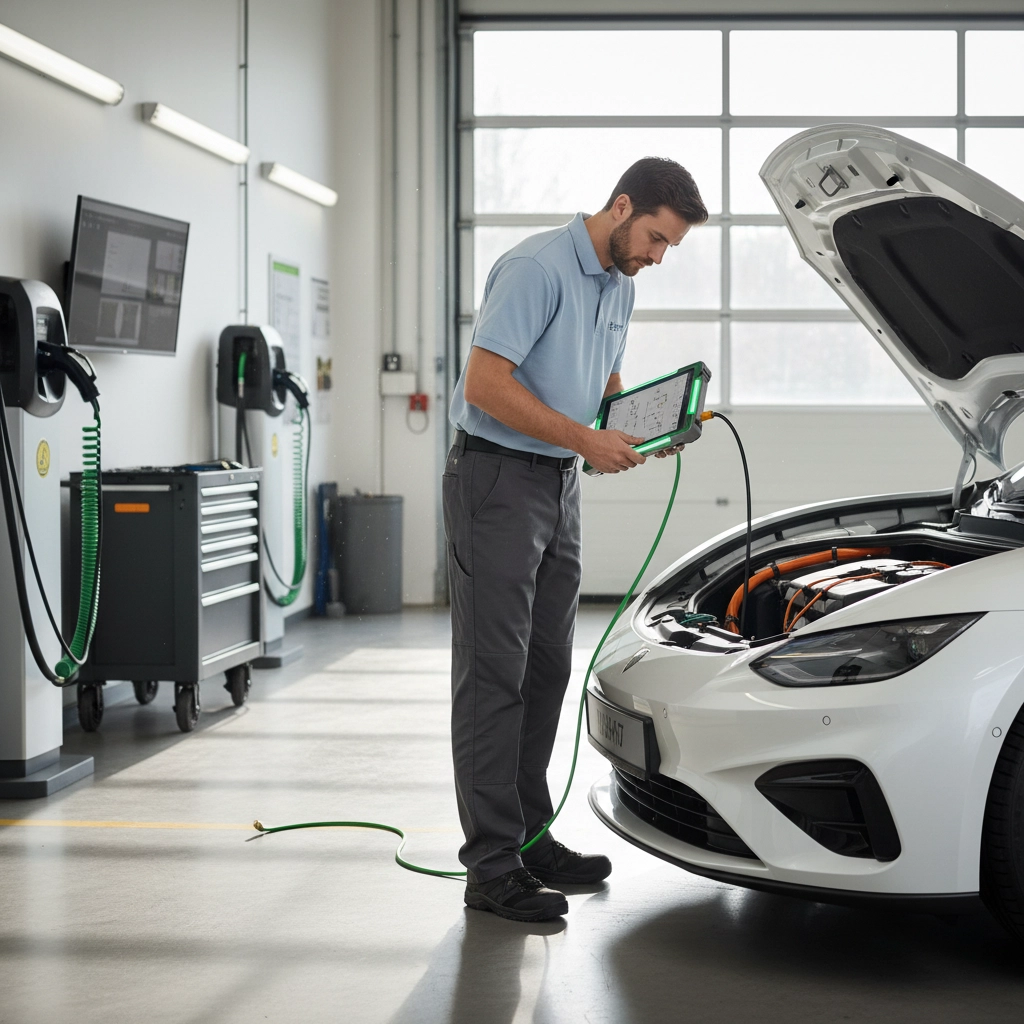Shopping for electric car repair in Santa Rosa? You're making a smart choice by doing your homework first. The EV repair landscape has evolved dramatically, and knowing what to look for can save you time, money, and frustration down the road.
Whether you're driving a Tesla, Nissan Leaf, Chevy Bolt, or any other electric vehicle, these ten insights will help you navigate the local repair scene like a pro.
1. Not All Mechanics Are EV-Ready
Here's the thing – your neighborhood mechanic who's great with gas engines might not be your best bet for EV repairs. Electric vehicles require specialized training and equipment that many traditional shops simply don't have.
Look for auto repair shops in Santa Rosa that specifically advertise electric vehicle expertise. At GreenTech Automotive, our technicians receive ongoing training on the latest EV technologies because we understand that working on your electric car isn't just different – it requires a completely different skill set.

2. Specialized Equipment Makes All the Difference
Electric vehicles need diagnostic tools that can communicate with complex battery management systems and electric drivetrains. The shop you choose should have invested in EV-specific equipment, not just adapters for traditional tools.
When you're searching for “electric car repair shop near me,” ask about their diagnostic capabilities. Can they properly test your battery health? Do they have the right tools to work safely around high-voltage systems? These questions separate the pros from the wannabes.
3. Safety Certifications Matter More Than You Think
Working on electric vehicles involves high-voltage systems that can be dangerous without proper training. Look for shops where technicians hold certifications for EV safety procedures.
This isn't just about protecting the mechanics – it's about protecting your investment. One mistake with high-voltage components can turn a simple repair into a major insurance claim.
4. Warranty Protection Should Be Non-Negotiable
Many EV owners worry that taking their car to an independent shop will void their warranty. The good news? Federal law protects your right to choose where you get repairs, as long as the shop uses quality parts and proper procedures.
When choosing car repair in Santa Rosa, make sure your shop understands warranty requirements and uses OEM or equivalent parts when needed. We keep detailed records of all work and use manufacturer-approved procedures to protect your coverage.
5. Convenience Features Can Be Game-Changers
Let's face it – nobody enjoys being without their car. The best Santa Rosa auto repair shops offer services that minimize disruption to your life.
Look for shops that provide free loaner vehicles, pick-up and drop-off service, or shuttle transportation. At our solar-powered facility, we understand that our EV-driving customers value sustainability and convenience equally.

6. Financing Options Open Up Your Choices
Electric vehicle repairs can sometimes involve expensive components like battery modules or inverters. Don't let cost concerns force you into cheap fixes that might create bigger problems later.
Many reputable Santa Rosa car repair shops now offer financing options for major repairs. This lets you choose the right fix for your vehicle instead of just the cheapest one.
7. Environmental Values Should Align
If you chose an electric vehicle partly for environmental reasons, why not extend that thinking to your repair shop choice? Some auto shops in Santa Rosa are embracing green practices like solar power, recycling programs, and eco-friendly cleaning products.
Our facility runs on solar power because we believe in practicing what we preach. When you bring your EV to an environmentally conscious shop, you're supporting businesses that share your values.
8. Transparent Communication Builds Trust
EV technology can seem mysterious, but good communication shouldn't be. The right mechanic will explain problems in terms you understand and provide clear estimates before starting work.
Don't settle for vague explanations like “your battery is bad.” A quality Santa Rosa mechanic should be able to explain what's happening, why it happened, and what options you have for fixing it.

9. Prevention Beats Repair Every Time
Electric vehicles generally need less maintenance than gas cars, but they're not maintenance-free. Regular check-ups can catch small issues before they become expensive problems.
Look for shops that offer comprehensive EV maintenance services, not just emergency repairs. Things like battery health checks, software updates, and cooling system maintenance can extend your vehicle's life significantly.
10. Local Expertise Offers Unique Advantages
Choosing a local Santa Rosa auto repair shop has benefits beyond convenience. Local mechanics understand the specific challenges of your area – whether it's dealing with coastal moisture, understanding local driving patterns, or knowing which EV models are popular in Sonoma County.
Plus, building a relationship with a local shop means you'll have someone who knows your vehicle's history and can spot patterns in problems or maintenance needs.

Making the Right Choice for Your EV
Finding the right electric car repair shop doesn't have to be overwhelming. Start by identifying shops that specialize in EVs, then look for the additional services and values that matter to you.
Whether you need routine maintenance or major repairs, taking time to choose the right shop will pay dividends in reliability, cost savings, and peace of mind.
Your Next Steps
Ready to experience EV repair done right? Visit our services page to learn more about our comprehensive electric vehicle maintenance and repair options.
From routine inspections to complex diagnostics, we're here to keep your electric vehicle running efficiently while supporting sustainable practices in our community. Because at GreenTech Automotive, we believe taking care of your car and taking care of our planet should go hand in hand.
Schedule your EV service today and discover why more Santa Rosa drivers are choosing green-certified automotive care for their electric vehicles.
